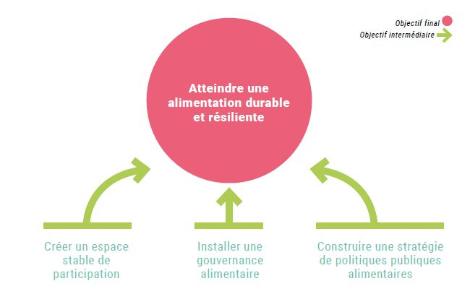From biosphere to food policy
A sustainable participation structure
janvier 2019
Fondation Daniel et Nina Carasso (FDNC)
Towards a Europe of territorial food systems?
This study is extracted from the analysis of twenty-two French and Spanish projects related to new food models, all highlighting different challenges.
In Spain, governance is being built, while French food systems are looking for solutions to change scale. But in both countries, accessibility remains the weak link.
At the start of the development of the food strategy, the island council carried out an agro-food diagnosis of the island: agricultural supply, food demand and consumption habits of the inhabitants. This enabled the partners to publish recommendations.
The participatory process undertaken with the stakeholders led to the production of a public purchasing guide, which prioritises the supply of local products to the island’s administrations.
Minorca, Spain
Recognised as a Biosphere Reserve by UNESCO since 1993, the island of Menorca has a surface area that is essentially agricultural and forested (88.4%). Dairy farming plays an important role, especially in the production of cheese. The protection of the island’s exceptional environment is now also based on food consumption policies. As a major importer of agricultural products, Menorca has decided to make food a key element in the sustainability of the Biosphere Reserve.
Mobilising the collective imagination
Menorca is a powerful figure in the Spanish collective imagination: a protected territory for its biodiversity, fauna and flora, the island enjoys local and international recognition. The Island Council of Menorca, which is the highest participation body of the Reserve, has a very broad representation of civil society within its ranks. By associating food with the preservation of the biosphere, it raises the awareness of a wider public, beyond committed citizens.
Adapted management
The public administrations of the island of Menorca intervene on the territory, paying particular attention to preserving the quality of life of its inhabitants. The island depends to a large extent on the environmental services provided by the biosphere. Agri-environmental practices have been developed since 2005. They aim to support the transition of the agricultural sector. The measures mainly concern extensive agriculture and landscape conservation. This management adapted to the territory makes an appropriate use of natural resources and allows the sale of local products while guaranteeing a dignified future for the farming world. The Island Council of Minorca (CIMe), which acts as a food council, is the participation body of the Biosphere Reserve. This body is characterised by its broad representativeness. It works on several lines of action, all aimed at implementing sustainable food policies. In 2017 Minorca will join the Milan Pact and defines its food strategy: to make food an essential axis for the sustainability of the territory.

The main actors in the project are the Island Council of Minorca and VSF-Justicia Alimentaria, an association whose mission is to promote a fair rural development model, serving as a driving force for social transformation. The public company Semilla is collaborating in the project. It is involved in policies for the development of local agriculture, as well as in the Leader Menorca association, which brings together public and private entities and works for sustainable development.